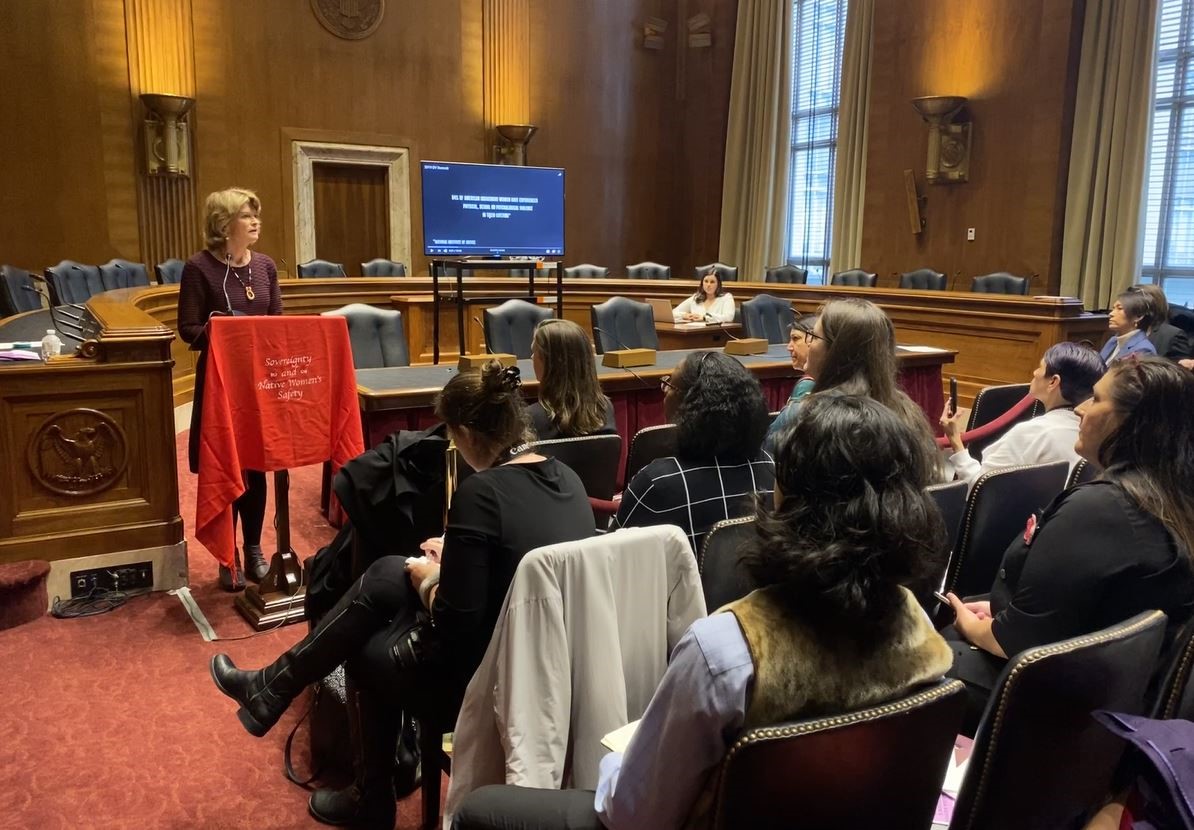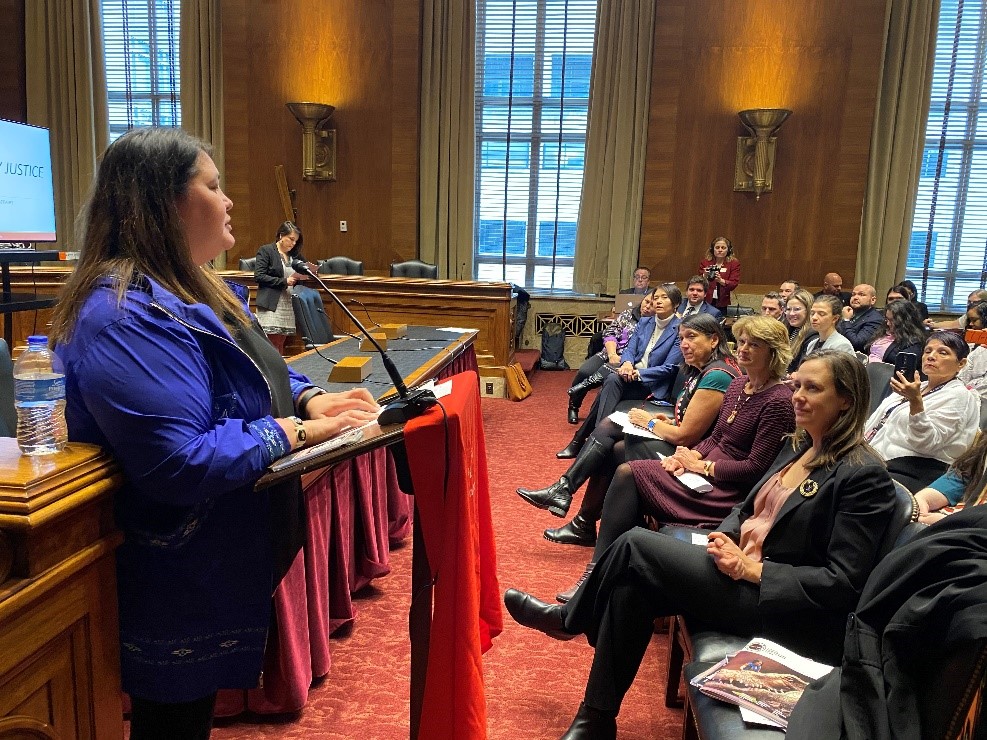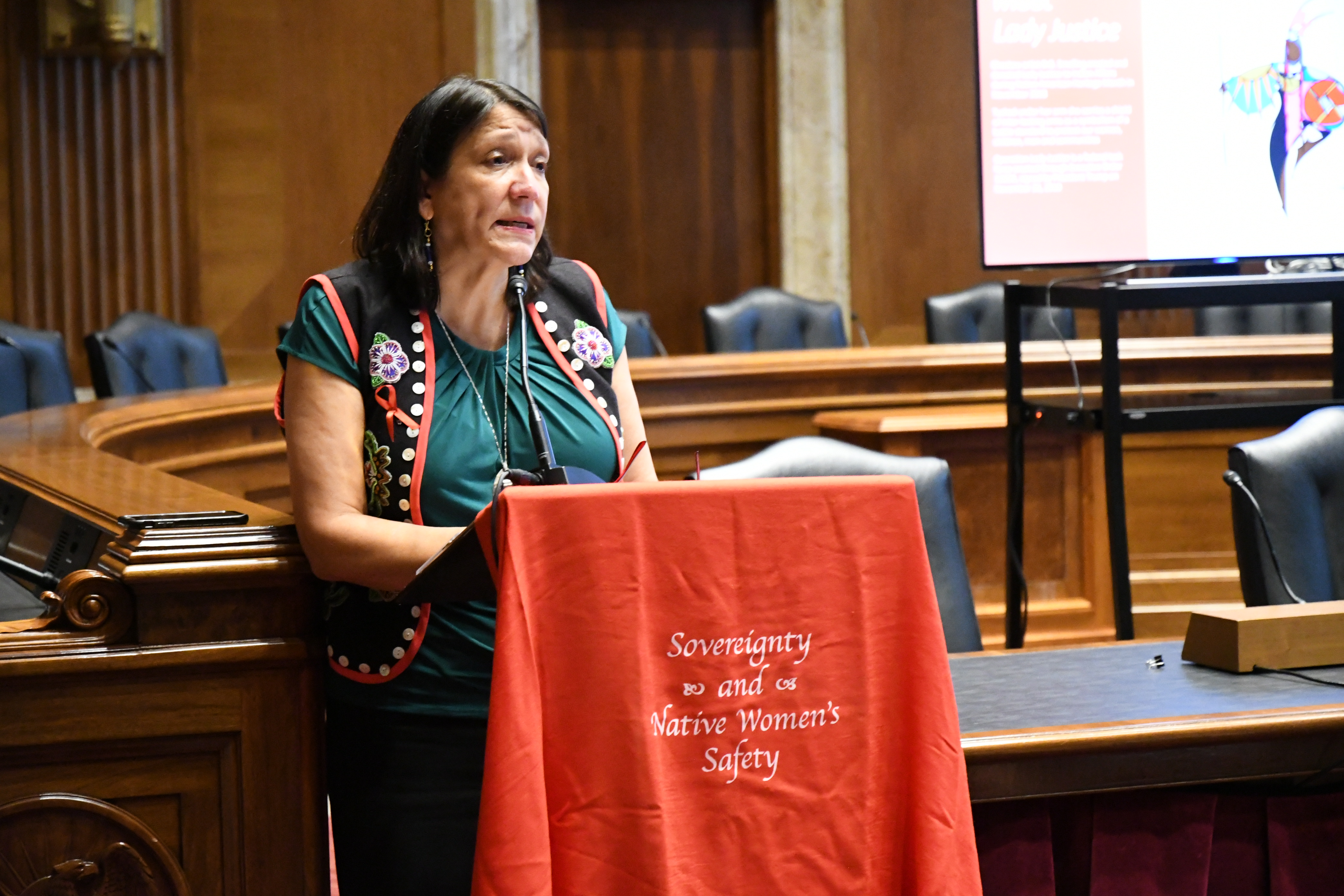Murkowski, Cortez Masto Co-Host MMIW Briefing on Capitol Hill
Moving Ahead to Increase the Safety of American Indians and Alaska Native Women
Building on her long-standing efforts to address rural Alaska’s public safety emergency, U.S. Senator Lisa Murkowski (R-AK) helped lead a Capitol Hill briefing with U.S. Senator Catherine Cortez Masto (D-NV) on ways to increase the safety of Native women and address the crisis of missing and murdered Indigenous people. The briefing also covered other topics, including issues for PL 280 states, the implementation of 2013 special jurisdiction, and various pieces of legislation that Senator Murkowski has introduced to improve safety in rural Alaska.
During the hearing, U.S. Senators Murkowski and Cortez Masto each spoke to their legislative efforts, as well as the benefits that multilateral collaboration will have in combatting the issue of missing, murdered, and trafficked Indigenous women.

Senator Murkowski speaking during the briefing.
“We are seeing real progress towards addressing this crisis of missing, murdered, and trafficked Indigenous Women, in Alaska and across the country, which includes serious efforts at all levels of government. But we can’t move fast enough. From the initiatives at the federal level with legislation and funding, to the task force Operation Lady Justice, individuals and agencies have stepped up in a strong and dramatic way. This crisis is bigger than any one individual –it is all of us. By working collectively to address the crisis, together, we can and will make a difference. This briefing is yet another step in bringing people together to work towards lasting change,” said Senator Murkowski.
“I’m proud to stand up to protect Native daughters, sisters, and aunts from abuse that has been hidden for too long. Senator Murkowski and I have been doing everything we can to pass Savanna’s Act and the Not Invisible Act. We can and must take action so that the next time a girl goes missing in Indian country, her family will have the tools to find her,” said Senator Cortez Masto.
During the hearing, Tara Sweeney, Assistant Secretary of Indian Affairs at the U.S. Department of the Interior, provided an update on Operation Lady Justice, a task force developed by the Administration focused on improving the criminal justice response and better equipping Native communities with the tools and information they need.

Assistant Secretary Sweeney speaking during the briefing.
“I’m proud to work with so many dedicated people on this issue who are providing a voice for advocates and for victims, representing the women in our communities. Gatherings such as this are a testament to that. We are making true progress on raising awareness turned to action. The Operation Lady Justice task force has hit the ground running. We are working diligently to determine best practices in how we can work together across multiple jurisdictions, by addressing data deficiencies, training individuals to understand signs of trauma informed cases, providing necessary resources towards unsolved cold cases, and supporting families of victims,” said Assistant Secretary Sweeney.
Michelle Demmert, Chief Justice of the Central Council for Tlingit and Haida Indian Tribes of Alaska Supreme Court, shared the importance of Senator Murkowski’s Alaska Tribal Public Safety Empowerment Act, Alaska’s unique history, and obstacles faced by PL 280 states.
Michelle Demmert speaking during the briefing.
“I was really thrilled to see Senator Murkowski introduce the Alaska Tribal Public Safety Empowerment Act. I like to call it the Village Empowerment Act. It’s really an important piece of legislation that would provide Alaska tribes, on a pilot basis, the ability to prosecute special domestic violence court jurisdiction. It’s an important bill that will also allow us to police our areas. And that’s really important because right now, no one is policing our villages. 40 percent of our villages lack any form of law enforcement and we have to decide if we want to run to save our life or try to get the perpetrator caught. 9-1-1 only exists in maybe half of our communities. We are citizens, we love this country, and we are honored to have all of you as our co-citizens. But we also need all of you to step up and realize that we are not treated as first-class citizens, not second-class citizens, more like third-class citizens, because we don’t even have law enforcement. This bill and many others would further protect the safety of Alaska Native and American Indian Women,” said Michelle Demmert.
The briefing also included speakers Brenda Toineeta Pipestem, Justice of the Eastern Band Cherokee Supreme Court, and Dawn Stover, Executive Director of the Alliance of Tribal Coalitions to End Violence, and was moderated by Elizabeth Carr, Senior Native Affairs Advisor for the National Indigenous Women’s Resource Center.
Background:
- Yesterday, Senator Murkowski introduced the Human Trafficking and Exploitation Prevention Training Act of 2020, which would prevent the human trafficking and exploitation of children by providing grants critical for training students, parents, teachers, and school personnel to understand, recognize, prevent, and respond to signs of human trafficking.
- In January of 2020, the White House task force, Operation Lady Justice, composed of federal officials from the U.S. Department of the Interior (DOI), U.S. Department of Justice (DOJ), and U.S. Department of Health and Human Services (HHS), held their first meeting. [Note: Assistant Secretary Tara Sweeney is a member of the task force.]
- In December 2019, the President signed into law a funding package which included for the first time, funding secured by Senator Murkowski to address the crisis of missing, trafficked, and murdered Indigenous women. Specifically, $6.5 million is included for the Bureau of Indian Affairs (BIA) to take a comprehensive look at the issue across the BIA and Indian Health Service (IHS), which includes funding for cold case work, background checks, equipment needs, training, and a directive for the IHS regarding forensic training. The bill also includes language directing coordination and data collection among Tribal, local, state, and federal law enforcement.
- In November of 2019, U.S. Attorney General Barr announced the Department of Justice would launch a national strategy to address the crisis of missing and murdered Indigenous persons. Following that announcement, President Donald J. Trump signed an executive order to establish Operation Lady Justice, a task force to help address the epidemic of missing and murdered Indigenous women.
- In November of 2019, the Senate Indian Affairs Committee advanced legislation led by U.S. Senators Murkowski and Cortez Masto (D-NV) to address the crisis of missing, murdered, and trafficked Native women. The bills, Savanna’s Act and Not Invisible Act, aim to combat the epidemic by improving the federal government’s response to the crisis. Savanna’s Act increases coordination among all levels of law enforcement, increases data collection and information sharing, and empowers tribal governments with access to law enforcement databases they need in cases involving missing and murdered Indigenous women and girls, wherever they occur. The Not Invisible Act engages law enforcement, tribal leaders, federal partners, and service providers and improves coordination across federal agencies. The bill designates an official to coordinate efforts across agencies and establishes a commission of tribal and federal stakeholders to make recommendations to the DOI and DOJ on best practices to combat the epidemic of disappearances, homicide, violent crime and trafficking of Native Americans and Alaska Natives.
- In October of 2019, Murkowski introduced the Alaska Tribal Public Safety Empowerment Act, legislation to empower tribes in Alaska to exercise the special domestic violence criminal jurisdiction on a pilot basis.
- In January of 2019, the Senators introduced the Justice for Native Survivors of Sexual Violence Act with Senator Tom Udall and the Native Youth and Tribal Officer Protection Act (NYTOPA), which build on the Tribal jurisdiction provisions in the Violence Against Women Act of 2013 (VAWA 2013). Justice for Native Survivors aims to address sexual violence on Indian reservations by restoring Tribal authority to prosecute cases of sexual assault, sex trafficking, and stalking. NYTOPA reaffirms Tribal authority to prosecute attempted and threatened domestic violence and extends the VAWA 2013 protections to children and law enforcement personnel on Tribal lands.









